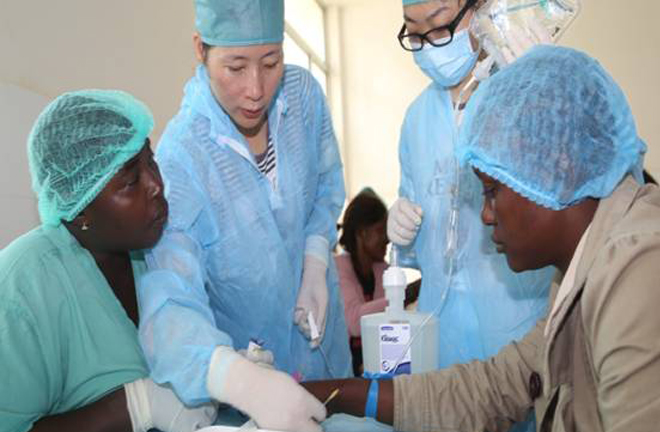Medical and health cooperation bolsters China-Africa ties

Nurses from Chinese medical team conduct training on medical services at the China-Sierra Leone Friendship Hospital in Freetown, the capital of Sierra Leone. Photo: Dai Xin/XINHUA
The Extraordinary China-Africa Summit on Solidarity Against COVID-19 was convened on June 17. Chinese President Xi Jinping chaired the summit in Beijing and delivered a keynote speech. The summit provided a model for international cooperation at this critical juncture in the fight against the pandemic.
After the outbreak of COVID-19, China and Africa fought the pandemic in their own way, building on the tradition of friendly cooperation between the two sides. They strengthened medical cooperation, shared the pandemic prevention experience, and enhanced policy coordination. Based on the realistic conditions of African countries, China has continuously offered a large amount of humanitarian assistance and vigorously promoted the resumption of production of related materials. At the same time, China has also provided a sufficient supply of anti-pandemic commodities for African countries to purchase.
Xi said that China will continue to help African countries by providing supplies, sending expert teams, and facilitating Africa’s procurement of medical supplies in China. China will start ahead of schedule the construction of the headquarters for the Africa Centers for Disease Control and Prevention (CDC) this year, work with Africa to fully deliver the health care initiative adopted at the Forum on China-Africa Cooperation (FOCAC) Beijing Summit, speed up the construction of China-Africa Friendship Hospitals, and accelerate the cooperation between paired-up Chinese and African hospitals, Xi added.
We pledge that once the development and deployment of a COVID-19 vaccine is completed in China, African countries will be among the first to benefit.” said Xi.
These practical and timely measures by China are of great significance in enhancing the confidence and ability of African countries to combat the pandemic and in promoting economic recovery and improving livelihood in African countries.
Over the past 70 years, China has continued to provide assistance to the health care sector in Africa. Altogether, medical teams have been sent to nearly 50 countries in Africa, which have treated over 200 million African patients. China has assisted African countries in building a large number of anti-malaria centers and in carrying out a number of medical cooperation projects, which have improved the continent’s medical governance capacity. During the Ebola outbreak in Africa in 2014, China dispatched medical teams and many planes were sent across the ocean to exclusively deliver aid to Africa, which played an active role in the fight against Ebola in Africa.
Chinese medical workers have overcome difficulties and accumulated experience dealing with infectious diseases in the process of assisting Africa. Many of the medical teams, technical experts and thousands of doctors on the front lines who offered anti-COVID-19 aid to Hubei Province were once medical workers who helped Africa fight Ebola.
At present, as the novel coronavirus pneumonia persists, the world faces a serious anti-pandemic situation. Fundamentally speaking, the only way for mankind to finally overcome the virus is to unite and work together. In this sense, the cooperation between China and Africa has set a good example in advancing international anti-virus cooperation.
For a long time, plagued by both poverty and disease, some African countries plunged into the abyss of a vicious circle of misery. According to statistics, Africa has for a long time borne the chronic burden of over 24% of the global disease, including about 70% of HIV infected people, 90% of malaria cases and one third of tuberculosis patients worldwide. Major disasters, malaria and other calamities strike Africa every year.
China and Africa are actively coordinating economic and trade cooperation with the production and cross-border transport of medical goods, forming a new form of trade cooperation. At the same time, they are fully utilizing the basic advantages of cooperation in cross-border e-commerce, network information platforms and connectivity in recent years. Through offline and online trading platforms, trade and material flows between the two sides have been maintained at a considerable scale, playing an important role in overcoming the impact of the pandemic and maintaining the economic infrastructure of both sides. As China’s economy gradually emerges from the shadow of the pandemic, China-Africa trade and investment cooperation will gain momentum, which will play an important role in boosting Africa’s economic recovery.
China has made improving the public health capacity of African countries a key area of China-Africa cooperation. The “Ten Cooperation Plans” formulated in 2015 and the “Eight Initiatives” proposed in 2018 both have specific proposals and measures to strengthen China-Africa public health cooperation. In May this year, Xi announced at the opening ceremony of the video conference of the 73rd World Health Assembly that China will set up 30 cooperation mechanisms of paired-up Chinese and African hospitals, accelerate the construction of the Africa CDC headquarters, and help Africa improve its disease prevention and control capacity.
In face of the pandemic, no country can detach itself from the interconnected world. China-Africa anti-virus cooperation is essential to both China and Africa and to the world.
Liu Hongwu is a distinguished professor of Changjiang Scholars Program of Ministry of Education and dean of the Institute of African Studies at Zhejiang Normal University.
edited by BAI LE
